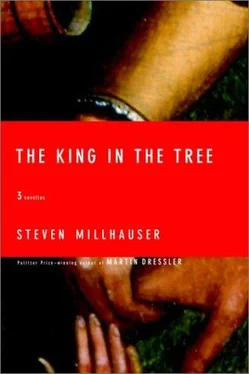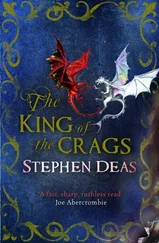The King has revealed his secret. I confess I was taken entirely by surprise.
In the early afternoon, directly after dinner, the King summoned me to the royal bedchamber, where I found him seated on a clothes chest speaking with Odo, who leaned back on a window seat with one long leg resting along the stone. Together with them I descended to the courtyard and passed the stables and the mews on our way to the King’s tower. I had expected to climb to the privacy of the King’s high chamber, but instead the King led us to the storage room on the ground floor, where in a dim corner behind a locked chest stands one of the four entrances to the inner labyrinth. The King supplied each of us with a small horn lantern, turned the stones, and led us into the castle wall. Like the passage that leads from beneath the white hind in the sixth tower, this one began to branch and turn. The King moved slowly but without hesitation, taking now one branch and now another, until he came to a small chamber hollowed out of the rock. A wooden bench with two silk cushions faced a wall, upon which hung a linen cloth painted with a likeness of the King in his crimson robe trimmed in ermine. On each side of the cloth, a small horn lantern hung from an iron ring on the wall. The King set down his lantern and sat on the bench, where he faced the cloth and motioned for me to sit beside him.
Odo — long, gaunt Odo, with his bony nose and his chin like the knob of a chicken bone — stood at one side of the wall hanging. Reaching up with his pale fingers, he pulled what appeared to be a cord concealed behind the edge of the cloth. Slowly the cloth divided, breaking the image of the King in half. The two cloths had been placed side by side so artfully that I had not been able to detect the jointure.
Behind the curtain stood the Queen. She stood very still, in her mantle of green samite trimmed with sable and ermine, fastened at the throat by a gold brooch. She wore a head covering and a white linen wimple. Her head was turned to one side, her lips parted slightly. Her right arm was raised and extended toward us; the finger beside the thumb was lifted a little, as if in supplication or admonition. Her cheeks and eyes shone in the dim light of all five lanterns. She was very lifelike. Only the turned head, the parted lips, the raised, extended arm with its lifted finger brought to mind the old wooden Virgin in the chapel. The face, half concealed by the wimple, had been powdered and vermilioned like the Queen’s. Yellow hair showed beneath the head covering, which was held in place by a gold fillet set with emeralds and jacinths.
Now Odo reached behind the Queen and withdrew his hand. Slowly the extended arm rose higher; the head began to turn. She looked directly at us, her eyes large, tender, welcoming. The arm began to lower to its original position; slowly the head turned away. The Queen stood motionless with slightly parted lips.
When I turned to the King, he was unnaturally still. His arm was raised as if frozen in the act of reaching toward the Queen, his head erect, his eyes wide, his lips parted as if in speech.
The King has released Oswin, who at once resumes his position as chief steward with all its privileges and powers. It is very strange. Perhaps the banishment of the Queen has rendered the steward’s imprisonment superfluous. Another explanation is possible: the King, tormented by longing for the Queen, feels a kinship with the disgraced steward, who also has desired the Queen. Oswin wears a patch over his blinded eye and behaves with impeccable propriety. He meets no one’s gaze, sits rigidly at the royal board, avoids the company of Modor, and tyrannizes over his servants, whom he punishes mercilessly for the most trivial faults.
Odo of Chester has departed for the court of the Count of Toulouse, where I have no doubt his art will be celebrated as a wonder of the age, while deep in the castle wall the King continues to visit the Queen in his secret chapel. I do not like these visits. Sometimes the King asks me to accompany him, in order to operate the curtain and the lever. Sometimes he visits the Queen alone. The visits take place suddenly, at any moment of the day or night. Last night, summoned by the King from sleep, I followed him to the chapel, where I drew open the curtain and pressed the lever concealed in the Queen’s back. When I turned to the King, I saw him staring fixedly at the slowly moving Queen, his eyes wide and unblinking. He then began to make low sounds, a mumble of speech that alarmed me. “My lord,” I said. The King seemed to awaken, and giving me one of his mischievous grins, which did not sit naturally on a face marked by sorrow and longing, he said, “Now tell me, Thomas. Isn’t the Queen looking well?”
The King’s sorrowing face, made oddly youthful by melancholy — the face of an unhappy boy.
No! My speculations have proved to be mistaken. The King’s reason for releasing Oswin lies elsewhere.
This afternoon I was summoned by a royal messenger to the prison tower. I was admitted by the guard, who thrust back the double iron bar of the door. Inside it was so dark that at first I could see nothing. A single small window, the width of an arrow loop, sat high up on the wall. A shaft of sunlight, frenzied with silent dust, lay slantwise across the dark air and struck the middle of the opposite wall. On the wooden planks of the floor I made out a crude pallet of straw and, in one corner, an iron chamber pot. Against a dark wall sat the King. He was wearing his royal robes; his hair, not bound in a net, lay loose on his face.
“Sit, Thomas,” he said. I immediately sat down beside him, on the bare floor.
“Assure them,” he then said, gesturing vaguely with one arm, “that all is well.”
“All is not well.”
“All is as it must be. Only this: they feed me too well. Water and bread: you will speak to Hainault.”
“There will be talk. The barons—”
“It is by my order. Let them know. Assure them, and they will be content. Your word, Thomas.”
“You have my word. They will not be content.”
“They will be less discontent.”
I remembered my sharp-minded pupil, fourteen years old, sitting in his father’s garden, battling with me over some question of logic. If each of the three persons of the Trinity has a real existence, how can it be maintained that God is a unity? If each of the three persons of the Trinity does not have a real existence, in what sense are they three?
A sudden flutter startled me. I leaped to my feet with drawn sword. In the deep dusk of the chamber I saw the King’s raven, settling on his knee. I felt uneasy — even ashamed — standing in the half-dark above my King, holding a sword.
“Let me leave my sword,” I pleaded.
“Prisoners have no swords.”
“And if it had been a rat?”
“Then I should have made him an archbishop, to absolve me of my sins.”
“The court misses you.”
“Court? There is no court. Here is my court: three spiders, a raven, and a fly. Am I not richer than the King of Cornwall, who rules nothing but an empty kingdom?”
“My lord—”
“I am tired, Thomas.”
Outside the prison door I instructed the guard to observe the King closely and inform me in detail about his diet, his health, his words, his movements — his thoughts, I wished to say. I then returned to my chamber.
The King has ordered his own imprisonment. Evidently he desires to punish himself, but the reason behind his desire is less clear. Does he feel that he must punish himself because he has wronged the Queen and Tristan by banishing them without proof, with nothing to justify his judgment but suspicion and rumor? Or is there a less elementary explanation? The King is suffering because he cannot live without the Queen and Tristan. By having himself imprisoned, he isn’t so much punishing himself as finding a way to display his suffering, to give it a definite and recognizable shape.
Читать дальше












